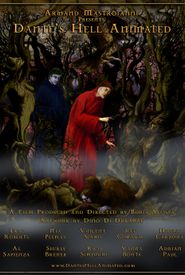Boris Acosta's cinematic endeavors, inspired by the timeless literary masterpiece, The Divine Comedy, have garnered widespread acclaim for their unyielding dedication to the original narrative, while simultaneously offering a visually distinct and previously unexplored cinematic experience.
As a testament to his artistic prowess, Acosta's work has transcended the boundaries of Hollywood, resonating deeply with Dantologists from around the world, who have come to regard his films as a genuine embodiment of Dante's visionary concept.
This remarkable achievement, which has not been replicated since 1911, serves as a poignant reminder of Acosta's unwavering commitment to his craft, as he masterfully brings the iconic tale to life through his unique cinematic lens, thereby cementing his status as a true visionary in the world of filmmaking.
Acosta's academic journey is distinguished by an in-depth exploration of Dante Alighieri's magnum opus, The Divine Comedy, as well as its lesser-known companion pieces, and a broader examination of significant Italian literary works.
He went on to earn a degree in Italian Literature from the prestigious University of California, Los Angeles (UCLA),thereby further honing his mastery of the subject matter and establishing himself as an authority in the field.
Acosta's remarkable accomplishment involved a meticulous and arduous process of petitioning Matteo Renzi, the then-incumbent Mayor of Florence, to grant a pardon to the renowned Italian poet Dante Alighieri, a feat that had not been achieved in over seven centuries since Dante's own time.
Dante Alighieri's Biography:
Born in Florence, Italy in the late 13th century, Dante Alighieri was a renowned Italian poet, writer, and philosopher. He is widely regarded as one of the greatest poets of the Italian language and one of the most important figures in the development of the Italian language and literature.
Dante's early life was marked by tragedy, including the loss of his mother at a young age and the exile of his family from Florence. He spent much of his life in exile, traveling throughout Italy and Europe, where he became acquainted with various intellectuals and scholars.
Despite his tumultuous life, Dante continued to write and compose poetry, producing some of his most famous works, including the Divine Comedy, a masterpiece of Italian literature that tells the story of the poet's journey through Hell, Purgatory, and Paradise.
Throughout his life, Dante was fascinated by the concept of love and its various forms, including romantic love, platonic love, and divine love. He believed that love was the central force that drove human existence and that it was the key to understanding the mysteries of the universe.
Dante's legacy has had a profound impact on Western literature and culture, and his works continue to be widely studied and admired today.
Acosta's linguistic proficiency is a reflection of his diverse cultural background, as a native of the United States with ancestral ties to Italy and Portugal. He possesses fluency in not one, not two, but four languages: English, Italian, Spanish, and Portuguese, a remarkable testament to his adaptability and ability to navigate complex linguistic landscapes.
Throughout the vast expanse of his remarkable life journey, Acosta has had the privilege of calling numerous countries his home, with notable residencies in the United States, Italy, Austria, Canada, Brazil, Uruguay, and Argentina, respectively.
His extensive travels, which have taken him to every corner of the globe, have undoubtedly played a significant role in shaping his artistic perspective and creative approach, as he has been exposed to a diverse array of cultures, traditions, and ways of life.
As a result, his experiences have likely had a profound impact on his artistic expression, imbuing his work with a unique blend of influences and perspectives that are both deeply personal and universally relatable.
From a remarkably young age of 8, Juan Acosta's innate curiosity and creativity sparked a lifelong passion for the art of filmmaking, as he embarked on his first cinematic endeavour, utilizing an ingenious combination of a large magnifying glass, a wooden box, and a light source to create a makeshift projection device. This pioneering experiment, which showcased his innovative spirit and technical aptitude, served as the foundation upon which his future accomplishments in the film industry would be built.
From a tender age, Acosta's innate sense of inquiry and artistic flair converged to inspire him to construct a rudimentary film projector, leveraging a collage of comic strips and a luminous source to cast a mesmerizing array of images onto a wall. This pioneering endeavour not only demonstrated his adaptability and ingenuity but also served as a harbinger of his destiny as a filmmaker, foreshadowing the creative endeavors that would occupy his future.
---
**Acosta's Biography:**
Born in [Year], Acosta's early years were marked by an insatiable curiosity and a passion for the arts. His creative endeavors, such as building a makeshift film projector, hinted at his future career as a filmmaker. Throughout his life, Acosta has continued to push the boundaries of storytelling, experimenting with innovative techniques and mediums to bring his unique vision to life.
As his interest in the art of filmmaking continued to flourish, Acosta's pursuits eventually led him to participate in a collegiate film project, marking the beginning of his hands-on experience in the industry. This initial foray into film-making was followed by a series of educational film productions, further honing his skills and solidifying his passion for the craft.
The culmination of his journey as a filmmaker came with the production and direction of The Divine Comedy - Dante's Inferno, Purgatory, and Paradise, a cinematic retelling of the revered Christian tale. This ambitious project showcased Acosta's artistic vision and technical expertise, as he brought the iconic story to life on the big screen.
















